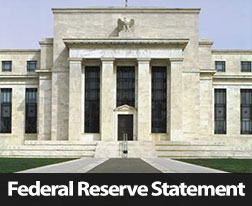FOMC Statement: Quantitative Easing Tapered by $10 Billion
 The Federal Open Market Committee (FOMC) determined that current economic conditions warranted another $10 billion reduction in the Fed’s asset purchases.
The Federal Open Market Committee (FOMC) determined that current economic conditions warranted another $10 billion reduction in the Fed’s asset purchases.
Citing improvements in economic indicators including labor markets and national unemployment, committee members said that further tapering of its quantitative easing (QE) asset purchases was warranted. The Fed will now purchase a total of $35 billion monthly in treasury securities and mortgage-backed securities.
While continued reductions in the Fed’s asset purchases could contribute to rising mortgage rates, the FOMC statement said that the Fed’s “sizeable and still increasing” holdings of long-term securities is expected to hold down long term interest rates including mortgage rates.
The FOMC statement included its standard caveat that reductions to QE purchases are not on a preset course and that committee members will continue close analysis of financial and economic news and conditions as part of decisions to change the volume of QE asset purchases.
Committee Monitoring Unemployment, Inflation
Unemployment remains “elevated” according to the FOMC statement. Committee members said that they will continue to monitor unemployment readings, but committee members expect that overall improvement in economic conditions will continue to justify the current target rate for federal funds at between 0.00 and 0.25 percent.
The FOMC statement notes that this “highly accommodative” policy will likely remain in effect for a considerable period after the QE asset purchases conclude.
Committee members continue to monitor the inflation rate, which remains below the FOMC target rate of 2.00 percent. Noting that inflation persistently below the Fed’s target rate could hamper economic growth, the FOMC said that it expects inflation to move toward its target rate within the medium term.
FOMC Releases Forecasts for Key Indicators
FOMC released a table of its forecasts for certain economic sectors. Highlights include a projected reading of 6.00 to 6.10 percent for national unemployment for 2014, and the rate of inflation for personal consumer expenses at between 1.50 and 1.70 percent for 2014. According to its projections, the Fed’s target inflation rate of 2.00 percent is likely to be reached in 2015 or 2016.
Fed Chair Yellen Gives Press Conference
A major theme of Fed Chair Janet Yellen’s press conference was that there is no set formula for Fed decisions concerning interest rates, inflation and tapering its volume of asset purchases. She cited geopolitical risks including conflicts in Europe and developing civil crisis in Iraq as examples of influences on U.S. financial markets, energy supplies and prices.
Ms. Yellen said that while consumer spending has increased, the Fed wants to see wage growth exceed inflation so that consumers would see an actual increase in their incomes. She also cited the Fed’s target inflation rate of 2.00 percent as important to continued economic recovery.
A wide range of opinions among FOMC members about federal interest rates was mentioned by Ms. Yellen as an example of overall uncertainty about the economy and developing economic trends. She cautioned investors to be mindful of this uncertainty.

 You’ve decided to put your home up for sale. Now, how are you going to make the most money selling it and get it sold the fastest? Perhaps you should consider providing owner financing, also known as seller financing.
You’ve decided to put your home up for sale. Now, how are you going to make the most money selling it and get it sold the fastest? Perhaps you should consider providing owner financing, also known as seller financing.  There are many reasons why a mortgage loan could be declined. It doesn’t have to be the end of your real estate dreams. Here are a few things to consider if you’ve been turned down for a mortgage.
There are many reasons why a mortgage loan could be declined. It doesn’t have to be the end of your real estate dreams. Here are a few things to consider if you’ve been turned down for a mortgage.